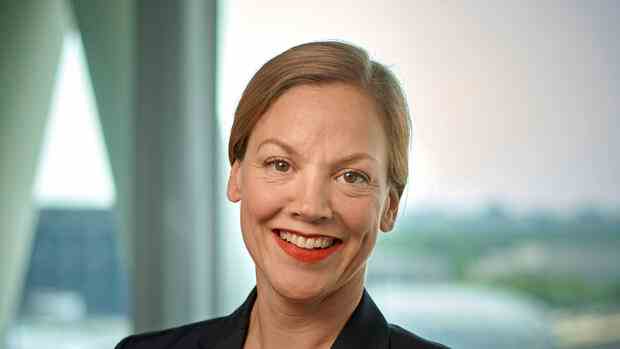In her new job, Rippel will seek close dialogue with politicians in Berlin, Brussels and the federal states with steel locations.
(Photo: PR)
Berlin Kerstin Rippel succeeds Hans Jürgen Kerkhoff at the head of the Steel Industry Association (WV Stahl). She becomes the chief executive officer of the association. This is the fifth woman to head a large business association. The others are Tanja Gönner (BDI), Kerstin Andreae (BDEW), Hildegard Müller (VDA) and Franziska Erdle (Metal Industry Association).
Rippel is facing an enormous challenge: It has to accompany the complete conversion of the steel industry to climate-neutral processes. “The steel industry is the backbone of the German economy – and at the same time determined to make a decisive contribution to achieving the climate goals in Germany and Europe,” Rippel told the Handelsblatt.
The 50-year-old added: “Shaping Germany as a sustainable industrial location together with companies in the steel industry is a matter close to my heart, which I will push forward with all my energy.”
In her new job, Rippel will seek close dialogue with politicians in Berlin, Brussels and the federal states with steel locations. Because the restructuring of the steel industry is unthinkable without solidarity with politicians and without massive support from public funds.
Top jobs of the day
Find the best jobs now and
be notified by email.
Companies such as Thyssen-Krupp, Salzgitter and Arcelor-Mittal have made investment decisions worth billions in recent months to switch to CO2-neutral production processes.
Rippel in close contact with the Ministry of Economic Affairs
The CO2-intensive steel production via the blast furnace route is to be replaced by the so-called direct reduction process. If climate-neutral hydrogen is used for the direct reduction process, CO2-neutral steel is produced.
The energy-intensive industry should get help.
(Photo: IMAGO/Panama Pictures)
However, this steel is significantly more expensive than steel from conventional production. The gap is to be closed with financial aid from the public sector. The aid must cover investments in new plants and the costs of ongoing production.
Just a few days ago, the Federal Ministry of Economics published a concept that outlines the aid for the steel industry. From her first day at work, Rippel will have to look for solutions in exchange with the Federal Ministry of Economics as to how exactly the aid should be designed.
In ministry circles it is said that “a double-digit billion amount will be made available for climate protection contracts so that energy-intensive industry can produce in a climate-friendly manner”. The steel industry is the first recipient.
The challenges are also great at Brussels level. On Tuesday, the Brussels institutions agreed to introduce a CO2 border adjustment from 2026, which should take effect from 2026 for steel, cement, aluminum, fertilizer, electricity and hydrogen.
>> Read here: EU agrees on dreaded climate protection instrument – associations warn of damage to industry
Imports from non-EU countries will then be subject to a levy that should correspond to the CO2 costs of European manufacturers. However, it is still unclear how exports from European manufacturers, which are burdened with high CO2 costs, are to be protected.
It will depend on how the free allocation of certificates in European emissions trading develops. WV Stahl will have to fight in Brussels for reliable regulations that do not overwhelm the companies.
advance the energy transition
Rippel is used to communicating with politicians. The lawyer has been Head of Communications and Politics at 50Hertz, one of the four electricity transmission system operators in Germany, since 2016. The business of transmission system operators is heavily influenced by politics.
The expansion and conversion of the electricity transmission network is one of the basic requirements for the success of the energy transition.
(Photo: imago images/Jochen Tack)
The companies are responsible for advancing the construction of the large “electricity highways” across the country in coordination with the Federal Network Agency. The expansion and conversion of the electricity transmission network is one of the basic requirements for the success of the energy transition.
Rippel’s predecessor, Kerkhoff, is retiring at the end of December after 14 years at the helm of the association as president and managing director. In the future, the functions of honorary and full-time positions will be separated at WV Stahl: Rippel will become general manager, Bernhard Osburg, head of Thyssen-Krupp Steel, will take on the position of honorary president.
>> Read here: All current developments in the energy crisis in the news blog
Rippel is the mother of two children. She is a member of the Greens and comes from a family with a political background: Her father Joachim Rippel is a member of the CDU and was Economics Minister for the Saarland from 2007 to 2009.
More: Why climate protection agreements could be the last chance for the steel industry.
